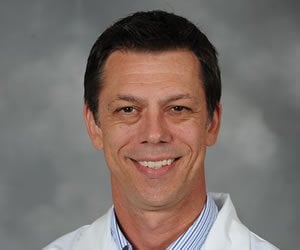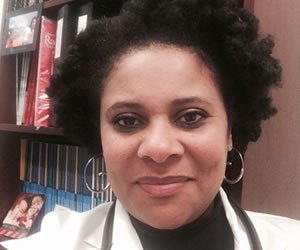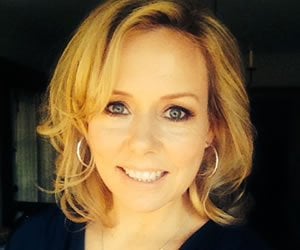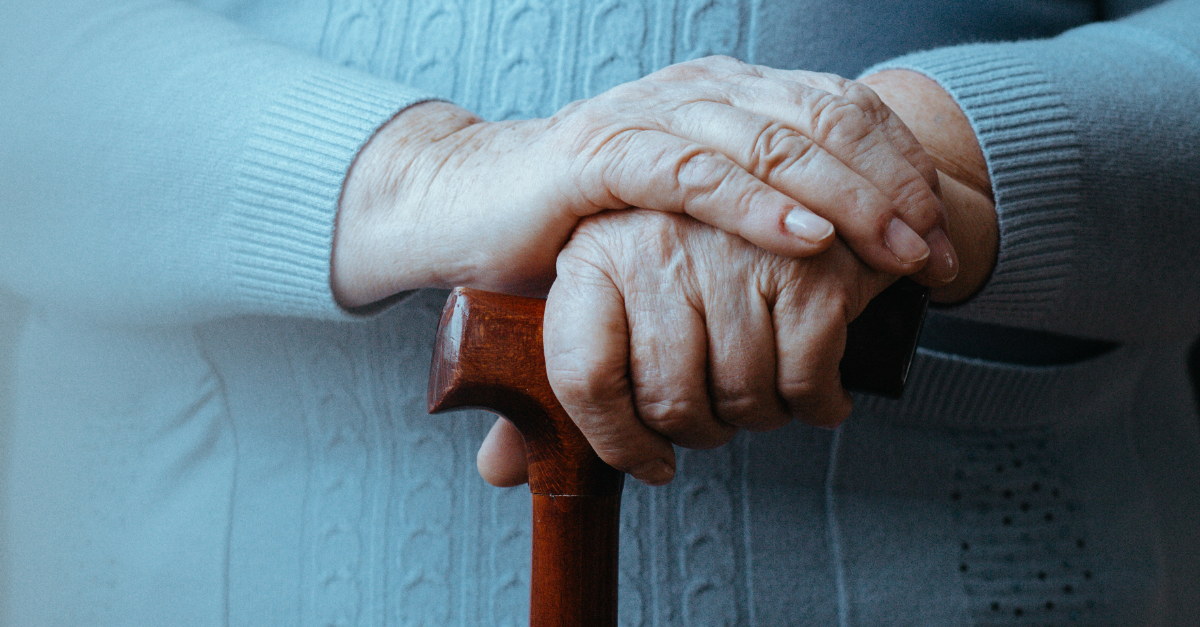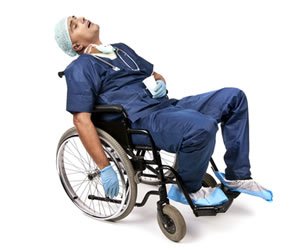Dr. Jeffrey Whitaker knew at a very young age that he wanted to be a doctor, though his specialty remained uncertain until he discovered podiatric medicine as an undergraduate pre-med student. Having graduated Magna Cum Laude with his Bachelor’s degree in Biochemistry from California State University-Long Beach, he later completed a second Bachelor in Cell and Molecular Biology with San Francisco State University, followed by the successful completion of his Doctor of Podiatric Medicine degree from the California College of Podiatric Medicine, which is now Samuel Merritt University. Dr. Whitaker graduated from the DPM program with Honors, ranking 4th in his class, and completed his three-year foot and ankle surgery residency with Western Pennsylvania Hospital, in Pittsburgh.
feature article
Chronicles of a Med Student: We’re All In This Together
Walking into my first day of medical school was a little like walking into my first day of kindergarten (if my memory does not fail me). Everything was brand new: I was being exposed to a new way of learning in a new environment, where people had new expectations of me, and where I was going to start from square one and build up a new circle of friends. I had carried the same set of friends in grade school and though I thought initially that college would’ve felt like this on my first day, it didn’t. I had a lot of friends from high school go to the same college as me, so it just felt like we were hanging out in a new place. And again college is very different from medical school in more ways than I can put into a coherent list. Starting medical school was unlike any other start in my life (besides kindergarten, of course). What if I had forgotten how to make new friends from scratch?!
Choosing a Specialty: The Generalist vs. the Early-Committer
Many students arrive at medical school with a bias that their liberal arts education has instilled, namely, that they should survey everything before deciding on their specialty. Before medical school, students matriculate at colleges that pride themselves on providing a diverse exposure to a variety of subjects: Computer science majors experience the canon of Great Literature before pursuing a life of code, and English majors can take “Physics for Poets.”
For a generalist student sampling from the buffet of medicine, it can be jarring to sit in lecture next to a classmate who declares on the first day of school that she intends to become an orthopedist. These early-committers appear to have whittled down their choices from day one. They magically become apprentices to a faculty member in their chosen specialty by the first quarter, have a publication by their first year, and seem to possess an intuitive roadmap for applying to residency that the generalist cannot read.
Dental school the second time around: An IDP student perspective
This article is reprinted with permission from the American Student Dental Association. It originally appeared in the Summer 2015 issue of Mouth.
Each year, dental schools across the United States graduate students who were already dentists. Coming from different backgrounds and nations, we are termed IDP, or International Dentist Program, graduates. ID Programs in the U.S. are one of the most incorporating and intensive dental programs around the globe. However, the realization of second graduation involves a different set of struggles that the traditional dental student might not be aware of.
20 Questions : Karen M. Winkfield, MD, PhD, Radiation Oncology
Karen M. Winkfield, MD, PhD, is a radiation oncologist with Massachusetts General Hospital, and she divides her time among clinic research in health equity and hematologic malignancies, teaching as assistant professor of radiation oncology at Harvard Medical School, and a clinical practice treating patients with lymphoma, leukemia, myeloma, myelodysplastic syndrome and other blood cell dyscrasias, and breast and gynecologic malignancies.
Dr. Winkfield received her bachelor’s degree in biochemistry from Binghamton University (1997), and her PhD in pathology (2004) and MD (2005) from Duke University. She completed an internship in internal medicine at Duke and a residency in radiation oncology at Harvard. Dr. Winkfield co-founded and directs the Association of Black Radiation Oncologists, and she’s been published in numerous journals, including the Journal of Biological Chemistry, Journal of the National Medical Association, International Journal of Radiation Oncology – Biology – Physics, Oncology, Journal of the American Academy of Dermatology, and New England Journal of Medicine. She also currently chairs the Health Access and Training Subcommittee for the American Society For Radiation Oncology and is chair-elect of the Health Disparities Committee for the American Society of Clinical Oncology.
The Risk Involved in Going to Medical School (and How You Can Subvert It)
Most people wouldn’t normally think of medical school as a risky investment. Sure, there are … Read more
The Med-Peds Residency: Big and Small, We Care for Them All
As third year medical students you’re rotating through your general specialties and you think you’re seeing familiar faces but in new places. Isn’t that your newborn nursery resident who assigned APGAR scores, now leading the code in the medical ICU? Some of you may have had similar déjà vu experiences but rest assured, your mind isn’t fooling you. At 79 programs across the USA and Puerto Rico, Combined Internal Medicine and Pediatric residents walk (briskly) through the halls of the hospital carrying both PALS and ACLS cards in our coat pockets. Our minds have been shaped to think broadly and decisively. We carry an air of calmness from our critical care rotations yet we know when to appropriately turn to our goofy side to connect with our patients. Through four years of versatile training, we are training to be the 21st century physician.
The Combined Internal Medicine-Pediatrics (commonly referred to as “Med-Peds”) is a four-year residency-training program that leads to dual board certification in Internal Medicine and Pediatrics. While there are many combined training programs offered in the US, the Med-Peds residency is by far the most ubiquitous and popular program available. During the four years of training, residents undergo a rigorous schedule of rotations ranging from adult and pediatric wards, MICU, PICU, NICU, CCU, Med-Peds clinic and specialty electives. By graduation, residents will have completed a total of 2 years of adult and 2 years of pediatric training. The frequency at which residents switch from one “side” to another changes depending on the individual residency program. The end product is the same: Individuals who are prepared to deal with acute, complex, chronic and preventive care for both adult and pediatric medical conditions. The broad training creates an endless list of career possibilities. We each carve out a niche that best fits the career interest we have in mind.
Five Ways to Make Your Audition Rotation in Anesthesia (or Other Specialty!) a Success
It is that time of year again. Medical school students across the country are preparing applications for residency and pursuing audition rotations at residencies they are hoping to woo into an interview and hopefully to match into their program.
Any audition rotation is a challenge. This is especially true for the anesthesia audition rotation. For medical school students who look great on paper, the audition rotation can either confirm they are a great candidate or confirm the program should not interview/rank them. For medical school students who do not have a stellar record, the audition rotation can open up doors.
Chronicles of a Med Student: Drinking from a Fire Hydrant
For the past several years, I felt like all I heard was everyone in medical school telling me how hard it is. I was a little worried, especially since I took a year off of school. How would I have the capacity to study anymore? Heck, I was used to spending my weekends and evenings lazing around, watching TV, and overall doing as I pleased. And now all of a sudden, I was expected to sit with my feet bolted to the floor staring at a computer screen with words like infundibular recess screaming at me for 9 hours a day. There was no way. All kinds of thoughts crossed my mind: I would lose all of my friends, gain weight from sitting around all day, and generally go insane.
What I Learned During My First Semester of Medical School
Students will feel a variety of emotions during the weeks and days leading up to the start of medical school, ranging from excitement to anxiety. Below are five key things I learned during my first semester in medical school, some of which I wish I had known before I began:
1. Every student is unique, so do what works best for you
Many people equate the preclinical years of medical school to standing before a water hose and attempting to drink all of the water that pours from it. The vast amount of information that you will be exposed to may seem overwhelming at times, but it is important to remember that generations of physicians have successfully completed their medical training. There is a way to manage this wealth of information.
How to ace your first patient encounter
As a medical student, you spend four years of college and the first two years of medical school studying non-stop for what feels like thousands of hours, cramming your brain with knowledge. But when the time comes to conduct your first face-to-face patient encounter, your confidence is rocked by the challenge of having to establish rapport, extract all the relevant medical history, and complete a physical exam, all while showing compassion, answering patient questions, and developing a differential diagnosis list and treatment plan in 30 minutes or less. Clinic is even worse with a meager 12 minutes scheduled for each patient encounter.
Top 5 Questions to Ask Your Pre-Health Advisor
If you’re interested in a career in medicine, one of the most important and helpful people will be your college’s pre-health advisor. There’s a lot of planning and preparation to do before you’ll be ready to apply to medical school, so it’s a good idea to meet with your advisor early. Make an appointment or go to drop-in hours at least once a semester to keep in touch about your classes and activities. When your advisor knows you well, they can help you find opportunities relevant to your interests and strategize about when and where to apply.
Here are some important things to ask about when you meet:
1. What classes should I take and when?
Your advisor can help you create a plan for which pre-requisite classes you should take and how you should schedule them. This will help you develop a timeline for when you’ll be ready to take the MCAT® Exam and apply to medical school. Different medical schools have different requirements, so your advisor can help you determine if you’ll need a post-baccalaureate or other program to help meet coursework requirements.
2. Are there any campus pre-med clubs, email lists, or workshops?
Many colleges have student run pre-med clubs that are a great way to make friends, form study groups, learn about local opportunities, and stay motivated. Your advisor may also send out information through an email list or social media and may hold workshops on various pre-med topics.
3. Does our school have a specific process for writing Committee Letters or Letters of Evaluation?
One of the most important and influential components of your application is the Committee Letter or Letters of Evaluation that you’ll receive from faculty and staff members at your college. The Committee Letter is a document or collection of letters written on your behalf to tell medical schools about you, your commitment to medicine, and your strengths. It’s important to know your school’s procedure so that you can begin early and have your letters sent in on time. Some medical schools will not consider your application complete until they have this letter.
4. Do you know of any medically-related opportunities in the community that will help me get experience?
Some colleges have relationships with local hospitals, clinics or other community-based centers that may allow you opportunities to shadow, volunteer, or work in a lab. There may also be a connection with a local medical school, or another organization, that has a pre-med summer or pipeline program. Your advisor will likely know about many of these and be able to help you decide which might be right for you. They’ll also be able to steer you away from places where other students may have had negative experiences. Be sure to check with them each semester as opportunities may come available at different times of the year.
5. Do you think I should take a gap year before starting medical school?
More and more students are taking a year or more in between undergrad and medical school for various reasons. Last year, more than 50% of accepted applicants had one or more years between graduating college and applying to medical school. Your advisor can help you decide what’s best for you and discuss what opportunities might make you a more competitive applicant.
Whether you’re just starting to think about medicine or you’ve already applied, your advisor can be a great resource throughout the process. For more tips, see AAMC’s Partnering with your Advisor.
Spaced Repetition in Medical Education
We all want to train to become the best clinicians we can be, but education in the health professions is often like drinking from a firehose. Worse yet, most of us haven’t learned how to learn – how to effectively synthesize and retain the knowledge for the long term, both to do well on board exams and to have that knowledge available to inform our clinical practice.When we came into medical school, one of the most common pieces of advice we’d get from upperclassmen was “don’t worry about remembering this; you’ll forget it all by rotations and you’ll have to relearn it anyway.” What a depressing thought – but it’s true! By the time they arrive in medical school, most students have forgotten the majority of what they learned in college courses. Students routinely need to re-learn massive amounts of forgotten information before taking their board exams, and residents eventually forget much of what they learned in medical school outside their specialty. All this translates into vast amounts of time wasted.
Five Simple Tips for a Better Personal Statement
The personal statement is, for many, one of the most dreaded aspects of the medical school application. It can be quite intimidating to be given a blank space so large, with the expectation that you will use it to answer a simple yet complex question: “Why do you want to go to medical school?” This question can be difficult to answer in the form of a personal statement because it is so open-ended; even students who “know” the answer for themselves may feel worried that they are not structuring the personal statement correctly, or are not saying everything that they feel admissions committees want to see. There is also the issue of deficiencies or weaknesses elsewhere in the application; the personal statement is supposed to be a platform for addressing these, but many students struggle to write about these openly and tie this into the rest of the personal statement.
20 Questions: Mellissa Withers, MHS, PhD, Global Health
Mellissa Withers, MHS, PhD, is an assistant clinical professor at University of Southern California (USC) in the Institute for Global Health and leads the Global Health Program of the Association of Pacific Rim Universities, a network of 45 universities in the region, where she teaches global health-related courses. Withers also works as an independent health research consultant, with research focusing on global reproductive health and women’s empowerment, including human trafficking, preventing unintended pregnancy, HIV/AIDS prevention among sex workers in Asia, and engaging male partners in family planning in sub-Saharan Africa. She received a bachelor’s degree in global development with a minor in ethnic studies from University of California, Berkeley (2001), a Master of Health Science (MHS) in international health systems management from Johns Hopkins Bloomberg School of Public Health (2003), and a Doctor of Philosophy (PhD) in community health sciences with a minor in cultural anthropology from University of California, Los Angeles (UCLA) Fielding School of Public Health (2010).
Bedside Ethics: The Story of Jane and John
Reposted from here with permission. The circumstances under which Jane and I met were less than ideal. … Read more
Chronicles of a Med Student: And So It Begins!
The minute the tasseled hat flew off of my head after “Pomp and Circumstance”, I knew I was no longer a kid. What a startling realization–one I’m sure many of you have experienced–for someone who has led a fairly sheltered life! Let me confess one little thing: I was scared. Not just an ordinary level of scared. The kind of scared that catches you by surprise to the point where you start bawling on your graduation day with your bedazzled cap and a brand new bachelor’s degree in your hand. I was taking a gap year and had no idea which direction my life was going to go next. I knew what I had been working for my entire life: medical school. But this was not the feeling I had anticipated when I completed my undergraduate career. I had practically planned my life out since I was in middle school: I was going to go straight from high school to college to medical school to a career. But things had changed; I had grown a little tired of the academic life and wanted to experience something new. I wanted to live a little! But figuring out what to do next and how to do it was intimidating.
Physician Employment Contracts: The Good, The Bad and The Ugly
In both hospital[1] and group practice settings, physicians are regularly asked to sign employment contracts that the group or hospital may describe as “standard”. While physician employment contracts can define the terms of the employment relationship in helpful ways, they can and often do contain clauses and obligations that may have a long-lasting impact on the physician. When negotiating a contract with a potential employer, physicians are well advised to take a hard look at key contract terms, including termination provisions, non-compete clauses, professional liability insurance terms and indemnification obligations, and negotiate to remove or revise overly burdensome terms prior to the start of the employment relationship.
10 Signs You're an Intern
1. 2 Days off in a row = Vacation!
In high school, I looked forward to winter break, spring break, and summer break. In undergraduate, it was the two weeks off over winter break and the week off between quarters. Anything short of a week off felt like barely time to catch your breath – definitely not a vacation. As a medical student, there was still winter break and most bank holidays. Now, as an intern, any time there are two days off in a row, what most of the rest of my non-medicine peers would simply call “the weekend” constitutes the most luxurious vacation.
5 Things You Should Know About Secondary Applications
Unlike other graduate school admissions processes, where there is typically only one round of applications, medical schools often have a primary application and a secondary application. The secondary application generally involves one or more essay questions that are meant to help the admissions committee better understand your background, qualifications, and career aspirations. Below are five things you should know about medical school secondary applications.

